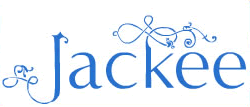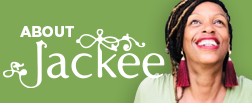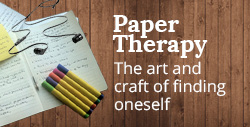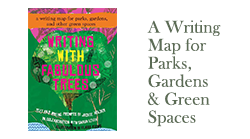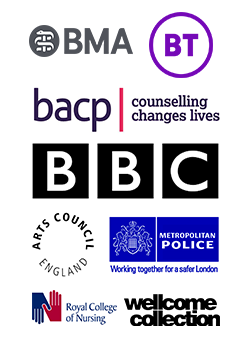Coaching
Thursday, April 25th, 2013
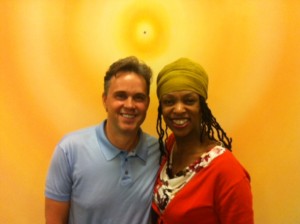
I had the pleasure of chairing an Event run by the Spirit Of Coaching at the Brahma Kumar’s entitled: How To Happy In Challenging Times. I spent today transcribing most of what was shared by the three presenters are all spiritual teachers and coaches. I was so moved by so much of what was shared that in no way did I fully absorb as I carried out my role of chairing the conversations.
I am sharing a few snippets from the conversations from all three in hope that you will take some time to listen to the video and have your own experience of the conversations.
For coaches there is somuch wisdom here about how to coach and hold a space for individuals workignin organisations where there is constant pressure, stress and change on how to move beyond their fears and limiting beliefs in these challenging times, how to build resilience and connect with our own true nature.
All three speakers speak passionately about the need to reconnect with the unconditional self which when we connect in with is always in a state of peace, harmony and love. You can watch the video here: http://www.youtube.com/watch?v=DjHYwQeNm7Y
In my first excerpt I share Robert Holden’s exploration of how to navigate our way through challenging times and a powerful definition of what it means to be a coach.
“When we run into the challenging times if we pay attention to them we will notice, there is no so such things as the dark night of the soul, when I really pay attention to myself in the middle of a challenging time what I can feel when I really pay attention is that what I call a dark night of the soul is really a dark night of the ego.
It’s my personality that’s going through the trouble. It’s my self-image that’s rocked. It’s my ego that’s having the really hard time and actually when I can attend to that suffering of the self-image of the ego and of the pain amazingly I begin to be aware of the big happiness. The support that is somehow there behind the scenes and the support that is offered from the soul, is always in a state of harmony, in a state of peace and happiness, that is the big happiness from the unconditioned self.
In a challenging time we are called to bring our self image, our ego, our personality, whatever you want to call it, our separate self we are asked to bring it back to the soul, to the self that we all share and rest and take instruction and have guidance and support along the way.
When we do this then we don’t just fight those challenging times in quite the same way. Everybody has had their fair share of challenging times and what’s awkward about a challenging time is that the one you’re in now often feels like the one you are not going to get through. Who you think you are won’t be able to get through that challenging time but who you really are can and will. Challenging times are asking us to come back to ourselves and let go of those toxic beliefs and to let who we think we are so we can access the truth of who we really are.
A coach is someone who is not fooled by your appearance. You’ve been telling them for an hour that your stuck and they are tempted to believe you but they are not going to. Because they know that it can only be the ego that’s stuck, the self -mage that’s stuck. You’ve been telling your coach for an hour that you’ve tried everything and it almost sounds true, partly because you believe it but it would only be the self-image that has tried everything. There’s a lot more to try beyond that.
Robert Holden, How To Be Happy In Challenging Times, Spirit of Coaching, April 14th 2013
- How does what Robert describes reflect and impact on your work as a coach?
- How much can you relate to of what Robert describes?
- How have you come through your own dark night of the soul?
- One of the quotes from Robert is that when, “ the coach is ready the client will appear.” That many of our clients come to teach us about our own lives and help us to develop and grow? What are your thoughts and reflection on this possibility? What evidence do you have of this happening? What connections can you make with the parallel process we talk about in coaching supervision?
Find out more about Robert Holden at: http://www.happiness.co.uk/
No Comments
Thursday, April 25th, 2013
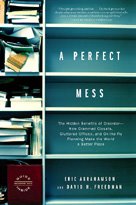
There’s an actual book about procrastination entitled: A Perfect Mess: The Hidden Benefits Of Disorder http://www.amazon.co.uk/s/ref=nb_sb_noss_1?url=search-alias%3Dstripbooks&field-keywords=A+perfect+Mess a perfect title both for this blog post and my office desk I avoid working from on most days.
So I was very heartened when a blog post from the fabulous Nina Grunfeld of Life Clubs www.lifeclubs.co.uk shared a great link in her blog post on April 22nd to an on line article about the spaces creative’s work from.
It was with a sense of relief when I read through the post to recognise that my disordered and cluttered office space, which on many levels feeds and drives my creativity, is also shared by many of the world’s more famous and well-known creative’s.
I love this picture of Nigella Lawson at work.
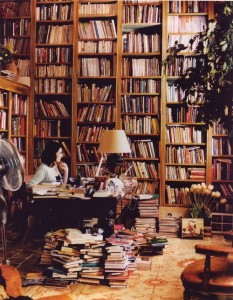
That’s me. If it was not for my organized, keep things clear, fastidious, Virgo partner our home would literally be a monument to books and magazines and if I could a tree growing in the living room would be great. In fact that was actually one of the images that was included in the online post.
A quick peek at the current perfect mess of my desk as of 8am this morning.
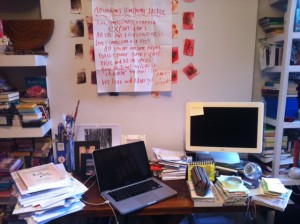
In the past I’ve done the good girl thing of tidying up the office, filing away the papers but my good deed lasts no longer than a week, maybe ten days at a push before the mess quickly claims back it’s space.
So now, I no longer expend my energies attempting to resist the mess, instead I let it be and just get on with the business of being creative.
There are the downfalls of course, like the times when a great quote that I know I wrote down somewhere on an index card gets lost, never to be found and of course it’s the perfect quote for an article or essay I’m writing about at the time.
But these moments believe it or not are far fewer than the hundreds of times I’ve remembered a story, or a quote or even a theme that I’ve been able to picture the book in my mind, the page it might be on (I’m strong on remembering whether a quote is located on the right or left hand of the page), go to my shelves, locate and open the book and retrieve the quote. No classification system needed here, just the pure, magical genius of I liken this to a ‘quote orgasm’. The feeling of achievement is so dammed satisfying.
To top it all off the headliners from the book, a Perfect Mess reads, “How crammed closets, cluttered offices, and on the fly-planning make the world a better place.” The book argues throughout that there are many hidden benefits of disorder. For messy creative’s like me this is comforting to know.
At the end of the day your creative space will be as individual and as original as your fingerprints. It’s yours to reflect exactly as you wish. What I’m learning is to reduce the judgments on what the space looks like and to expend my energies on the processes and learning that emerge form the many creative moments and outputs in my day. To me that is the real source of my creative engine.
The other thing I am realizing that my desk is not the place I feel most confident and comfortable working from. My desk reminds me too much of formality and having to get things right. I’m realizing that my desk is a space where I house and hold my papers and stuff. It’s not where I generate my best creative work.
You might be surprised to know that some of the places I work best are on trains, tubes and buses, somewhere out in nature, or in a café, sipping on a glass of wine (I know I should be drinking water).
When it comes to trains the longer the journey the better I work. I once arrived at Euston station after a 2 and a half hour journey and was astonished at how absorbed I had been in my writing that the whole journey had passed me by.
On journeys across London’s Victoria, Central and Jubilee tube lines I’ve birthed, edited, revised and proofed many of the posts, on the blogs on my website. I’m far more productive sometimes when on the move than when I’m at my desk.
One summer my desk became the lawns of Dulwich Park (it was one of those moments when the weather was so much more promising) and on another day I camped out for the day In Kew Gardens. When I need space and time to deepen I head for the primal nature of Richmond Park which is both creatively and spiritually uplifting.
More recently I’ve found a great spot to write from in my newly refurbished local library. But it means being first in line when the library opens its doors at 9am to secure my favourite writing spot.
To sign off I’ll leave you with a few more of the images from the online post showing the workplaces of the “famously creative’ and a link to Nina’s blog post http://www.lifeclubs.co.uk/footer-blog In my next post Ill include some images from two great books in my collection entitled, Writer’s Houses and Writer’s Desks.
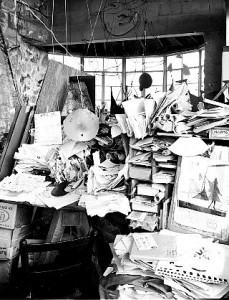
Alexander Calder, Sculptor
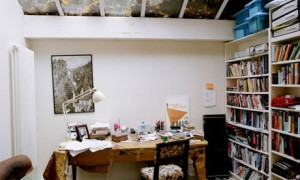
Martin Amis, Writer
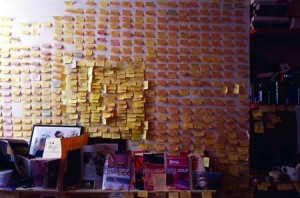
Will Self, Writer
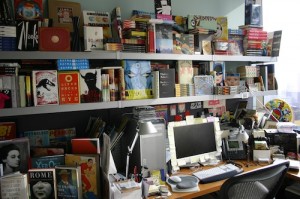
Chip Kidd Book Cover Designer
Maybe one day my desk will look like this……….
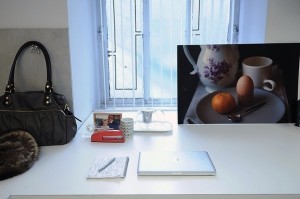
Amanda Hesser, Food Writer
All images except image of Will Self’s desk are from the book: 40 Inspiring Workspaces Of The Famously Creative
No Comments
Monday, April 1st, 2013
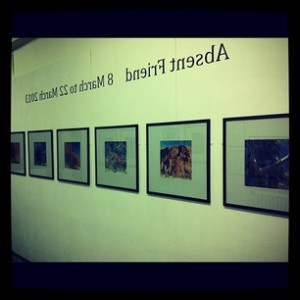
Two Friday’s ago I woke up determined to take myself on an Artist date, a term coined by writer and creative practitioner Julia Cameron. An artist date is a creative solo date you do with yourself. The destination is up to you. You could take yourself somewhere obvious like an art gallery or a museum or a visit to a part of town or the country you never get to visit.
Today in particular I was on a mission. I wanted to catch the last day of the exhibition of a former coaching client, Reen Pilkington who sadly passed away in November 2012.
I wanted to pay my respects to a gentle soul whom in our two periods of working together really brought together the different elements of her creativity and life purpose.
Reen Pilkington was a passionate photographer. In 2000 she shot a series of photos of me from which one particular image I’ve used in the last 12 years as my signature photo publicity shot. I love that image Reen took of me which captured a happy and more playful part of my soul.
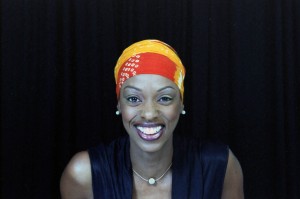
When we started our coaching work together Reen’s goal was to raise her profile and share her work as a photographer. She explored different ways of bringing her work to a wider audience and it was during this period that her work and involvement with the South London gardening and ecology centre for young people with learning difficulties Roots and Shoots took off.
Today as I walked through the small exhibit of Reen’s photos and drawings at Morley College it was affirming to see Reen’s work publicly displayed. I hadn’t quite remembered just how significant was her love of the environment, a passion we both share. I smiled when I viewed the several images of trees in her exhibition – we had the same nature soul.
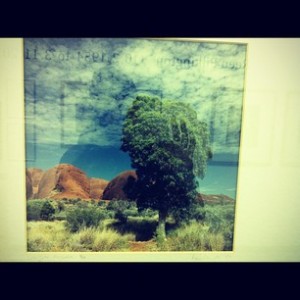
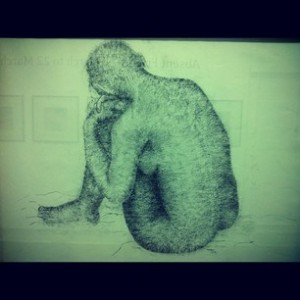
Taking in her exhibition also got me thinking about the legacy we leave behind. I’ve always thought that questions like: How would you like to be remembered? – really felt quite cheesy. But now standing in front of some of Reen’s work I am appreciating just how important it is to consider what we will leave behind that will be a tribute to our life and our contribution.
Do you have a body of work that will capture your essence, your contribution or that will tell a story of what really mattered to you? If you are unsure of your response why not use the following prompts to begin that inrquiry.
- If a short film was made about your life, what would the story be about?
- If a book was written about your life what would it’s title be?
- If you had to pick 12 photos that tell the story of your life in pictures what would 12 photos be?
- If you had to pick a photo for each year of your life that tell the story of your life in pictures what photos or images would you choose?
- What music tracks would you choose to be the soundtrack of your life?
- What is your body of work? How would you like to be remembered? What and how will your contribution be remembered?
Do spend a few moments writing down your responses to some or all of the questions above. Once we start answering these questions for ourselves we can then more easily create a space to explore similar or the same questions with our coaching clients.
In the meantime do enjoy a few images from Reen’s exhibition, Absent Friend and a short film clip.
After my time spent viewing Reen’s images I went and found an empty classroom and sat down and started to write. The quiet was only interrupted by the noise of the outside traffic. I realised how much I needed this quiet space. How easily and quickly I return to myself when I give myself this kind of quality of time and space.
I recognised just how much I needed to find an oasis of quiet and calm in what has been a hectic two months.
I realised how content I feel sitting in my own space and spending moments of my day alone. How replenishing it is not to be sitting in front of a computer reading emails.
My levels of satisfaction and conbtentment rise significantly when I write.
Right now I am smiling. I have gotten my creative fix and now I am more than ready to face the rest of my day.
Thank you Reen for being part of my creative medicine and sharing my Artist date with me.
Reen Pilkington Retrospective 10th February 1954-3rd November 2012
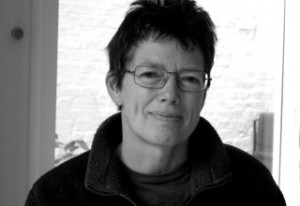
All images copyright of Reen Pilkington
No Comments
Wednesday, March 13th, 2013
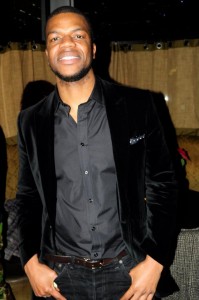
This is the third in the series of inner-views on Mentoring. This time we hear from Tokunbo Ajasa Oluwa who is now Head of O2 and Bauer Media’s Go ThinkBig that supports the career aspirations of the under 25’s in the UK.
In this inner view Tokunbo shares his reflections on his journey over the course of our mentoring relationship and his time at the BBC.
What is your first memory of meeting Jackee?
My first memory was being struck at my interview by the powerful aura and presence Jackee has. I remember thinking she doesn’t seem like the average BBC employee and just had something quite extraordinary about her. Once I got onto the programme I could feel and knew I had just begun a life defining experience.
What did you learn from your time at the BBC?
Whilst there I learnt about how the different components of the organization worked. I learnt that I had a real passion for working in the media and being creative. I also learnt about the dedication it takes to make such ambitions a reality.
How would you describe your relationship over the last 18 years?
I would describe it as a safe and nurturing space where I can be totally vulnerable yet at the same time empowered. It is a real and rare relationship that has depth, substance and love. Regardless of how much time goes by between interactions it always provides me with the same positive feeling.
What has stood out most about our time together?
I think what has stood out to me is that Jackee has ALWAYS been there for me. Whether we meet in person or over the phone or email or via one of her beautiful hand written cards…she is always there.
How would you describe your relationship with her daughter Aida?
I love Aida dearly and when we do get to spend quality time I try my best to be a sounding board for her, the same way her mother has been for me over the years.
I give my opinion when she seeks it and I try to give her insight to how I went about tackling certain life decisions. Aida has grown into an amazing young woman and I’m so proud to be part of her life.
What difference has mentoring made to your life?
Mentoring is something that I simply swear by. It has made a huge difference in my life. It’s provided the guidance and encouragement to challenge myself to achieve. Following my first experience of mentoring on the BBC project, within each chapter of my life I have recruited an additional mentor to support me during that part of my life journey.
What would you advice young people to look for in a mentor?
Look for someone that has integrity. Someone that is of relevance to your ambitions and a person that inspires you. Also a person that will challenge you to explore beyond your comfort zones.
What do you believe to be the most important qualities of a great mentor?
To be a good listener, demonstrate empathy and the ability to encourage critical thinking and motivate.
If you had a chance to do anything differently from your life over again what would it be?
Probably apply myself more during my years in education.
No Comments
Saturday, March 9th, 2013
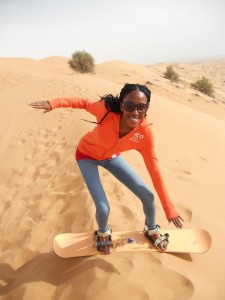
This is the third in the series of inner-views on Mentoring. This time here are the clips of a rare inner-view with my daughter Aida who met Toks, Camille and Kwadjo when she was 6 years old. They have gone onto to be great mentors, God parents and supportive friends and guides to her in her formative years. Here’s some reflection from Aida in what that journey has been like.
1. What is your first memory of meeting Kwadjo, Toks and Camille?
A vague memory of me meeting them would be at the BBC studios. Other more prominent memories are at gatherings. And it was always the 3 of them together!
2. How would you describe your relationship with all three over the last 18 years?
Real. I think of them like my big cousins. I can go to each of them for advice, receive good feedback and by the end of it laugh!
3. What has stood out most about your time together?
As I have grown up I have developed a strong bond with them. I don’t have to see them every week or speak to them every month! When we do spend time together we all reconnect naturally!!!
4. How would you describe your relationship with each of the above?
Toks- Big cousin. Good strategist. Gives me guidance on my chosen paths.
Kwadjo- Creative inspiration. Following him filming documentaries and such a go getter!
Camille- The real talker. Have such a laugh when we are together.
5. What difference has their mentoring made to your life?
It has given me a support network that I believe will be there for life. I think it’s invaluable to have such people in your life no matter what age you are for times of need and guidance.
6. What would you advice young people to look for in a mentor?
Somebody who is willing to listen with open ears. A person who is worldly and supportive. A mentor who can always see the silver lining even in bad times. You also need a mentor who you actually can get along with. It’s also important to relate to each other.
7. What do you believe to be the most important qualities of a great mentor?
Empathy, honesty, humor and kindness.
8. If you had a chance to do anything differently from your life over again what would it be?
Nothing. I wouldn’t be where I am today. Oh wait. Learn Gymnastics!
No Comments
Saturday, March 9th, 2013
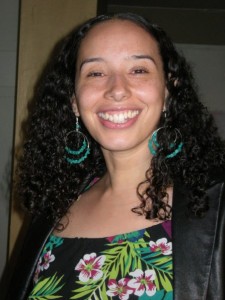
This is the second in the series of four inner-views with three young adults I mentored 18 years ago at the BBC which charts the journey of our mentoring relationship, their personal views on mentoring and their eventual mentoring of my daughter Aida who is now almost 24. Our second inner-view is with Camille Curtis who works as a Social Inclusion Project officer in the arts. Camille is Mum to two beautiful children of her own, Maya and Dominic.
1. What is your first memory of meeting Jackee?
My first memories of meeting Jackee goes back to the first BBC mentor programme that I was a part of. I remember being in the presence of a woman that was very warm & welcoming yet professional, articulate & organised.
Jackee had a presence about her that I felt was commanding. Whether this was simply her natural beauty & stature or whether it was more than that I can’t say… But I always felt that, this woman had something very special about her.
When she talks, you listen. Her words were powerful, yet soft & nurturing.
2. What did you learn from your time at the BBC?
Firstly – it was so nice to be a part of a multicultural team (students, mentors, guest speakers etc…). That opened my eyes to just how diverse the BBC could be. I really liked having a mentor as well as having a placement.
Through this journey, I/we met so many different people who did varied work. That was beautiful to see. On reflection, I learnt that you have to work hard to achieve success, but it’s possible to break through traditional institutions and leave your mark. Various political internal issues, we weren’t privy to but would reveal themselves as I/we got older – although this is life & happens in many organisations.
The journey also confirmed to be that I did want a creative career. I was attracted to the BBC Mentor scheme originally as I was doing a Btec in media studies.
3. How would you describe your relationship with Jackee over the last 18 years?
WOW!. I almost can’t believe that it has been that long and that it has evolved as it has. Something obviously just clicked between us… I enjoyed being on the Mentor scheme so much that I became a student liaison officer for the next one just to stay in the loop. Here was where I met Toks & Kwadjo…
Now, there were so many interesting individuals on my programme as well as on the second programme which I worked on (with individuals that I’m still contact with) but I don’t know how the four of us connected in such a manner. If my memory serves me right, we just enjoyed each others company as the four of us & maybe we developed it into a focus group…
We would make a point of catching up maybe twice a year and discuss our lives, chart our goals & how we going to achieve them. Through this group we received support, guidance & ideas with how to make our dreams come true.
This was valuable to me & although my friends on the outside of the circle would also offer support there was something unique & special about this arrangement. This relationship has grown & developed over the years in the most organic, natural way.
4. What has stood out most about our time together?
What I particularly love (although I expect this is in all of my relationships) is the honesty & safety I feel that we have with each other.
I almost feel that when Jackee wrote her book and was ordained & we were invited… Our relationship stepped up a gear…. There were a lot of revelations & insight that brought us closer together I feel. This was because; it wasn’t just the three of us revealing ourselves to Jackee asking advice…
There was a turning point when Jackee went from Mentor/Auntie/Elder to Friend/confidant. Maybe we were just that bit older, mature, wiser that we were able to contribute with clear & open eyes.
We all wanted to contribute to this and that is what has made it so unique. It hasn’t been forced… It is wanted….
All I can say is… When I look at the picture of the four of us, all I can do is ‘Smile’.. It brings me so my joy in my heart it’s unreal. Thank you Jackee, Toks & Kwadjo for bringing such joy into my life. This relationship is priceless J.
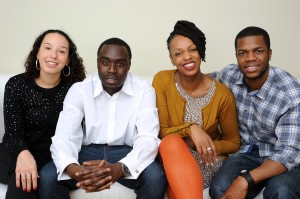
5. How would you describe your relationship with her daughter Aida?
I have a good relationship with Aida but really I’m building my relationship with Aida onto a next level.
More recently Jackee has made me one of her God mothers – this is a real privilege but I need to be on top of my game and get involved. It has been pleasure for me to see & witness Toks & Kwadjo become Aidas God Fathers and to be invited to special occasions in the Holder household.
6. What difference has mentoring made to your life?
I have had many people in my life that have inspired me. This could be over a period of time or simply from hearing them speak once or twice.
Jackee in particular has offered consistency over a period of time & for some reason Jackee has a way of delivering her suggestions and constructive criticism in a way that is easily digestible.
I can be secretly stubborn but I can remember advice that Jackee has given me from the first year or two that I was a student.
Mentoring should support your journey in life, your career, your relationships & confidence.
7. What would you advice young people to look for in a mentor?
- Someone that you can trust but you will allow them to challenge you
- Good aura – trust your instincts
- Expertise or wisdom in a particular area
- Consistency
- Someone who genuinely is looking out for you
8.What do you believe to be the most important qualities of a great mentor?
- Honesty/keep it real
- Warmth
- Can reflect themselves (they are human too)
- Good communication skills
- Sense of humor. Can laugh at themselves and/or life
- Has lived a life with which they can draw reference from
9. If you had a chance to do anything differently from your life over again what would it be?
To be honest, I don’t have any regrets & every choice that I have made or has been made is for a reason.
For instance, after I did the documentary with Jackie Osei-Tutu and then got involved with MTV, I had my daughter Maya… I took a year out to be a Mother & came out of the media circuit. It was very hard to get back in. Do I regret having my daughter – Did this hinder my personal media career? Maybe or maybe not….
Due to my decisions, I’ve ended up as Social Inclusion Project Co-ordinator managing performing arts & media youth provision for young people that are socially excluded for a range of reasons.
So I’m not making documentaries about life & socially excluded communities but I’m in fact using creativity as a means to re-engage challenging young people who can hopefully have successful lives in the creative industries or simply feel good about themselves.
I find this work very fulfilling & maybe this was my destiny. Mentoring, supporting & showing love is a huge part of the work that I do…. So in answer to your question, No… Not really…
No Comments
Monday, March 4th, 2013
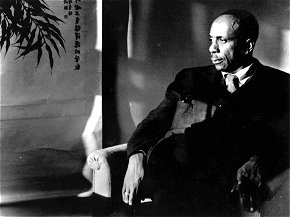
Before you read the rest of this blog post take a minute to really connect and engage with the question below. Run it over as many times as you can in your mind and capture any initial first thoughts in a notebook or a blank sheet of paper.
“Don’t ask what the world needs. Ask what makes you come alive, and go do it. Because what the world needs is people who have come alive.” (Howard Thurman)
I have seen this question quoted several times over in books, blogs, articles and on all over the Internet. It’s one of those questions that’s easy to glance at, to travel over each word with the eye and to send the mind a fast message that says, “Yes this is a good one and then do nothing more with the question for the rest of your days.
That is of course until life taps you on the shoulder in the form of a life event or crisis and reminds you in no uncertain terms that now is the time to pay real attention.
Or perhaps the discomfort of some part of your life or work becomes so unbearable you know that in order to move forward you must sit and be with the very question you have all these years tried to ignore.
That’s where I am right now, sitting and being with some very uncomfortable questions. Questions I want to lock up in a box and throw away the key. But like I’ve said these types of questions know how to seep through the smallest of cracks, they know how to tap on your shoulder and if you don’t listen they are experts on tugging on your hair and screaming your name out loud.
Socrates the Greek philosopher was renowned for asking what are referred to as Socratic questions that there are rumours that he was murdered for it. He would walk with his students out to the town gates asking difficult and penetrating questions. Rumour has it that he was murdered because he asked too many questions that challenged the status quo.
This is exactly what a coach does. A coach asks the type of questions that challenges the client to think outside the box, to think beyond their own status quo, beliefs, habits and attitudes into new ways of thinking and doing. Not always an easy or comfortable journey but very often a journey that is essential if we are to grow.
An Inquiry question is a powerful way of developing and deepening self awareness and self understanding which can radically deepen the clients understanding of their deepest desires, capabilities, skills and resourcefulness.
The question I pose this Monday morning came from the lips of the African American philosopher, theologian and educator Howard Thurman. This transformative question is a blend of both Socratic and Inquiry. It’s the kind of question that invites deeper reflection and inquiry and does not demand an instant answer. I invite you to sit and work with this Inquiry question for the next seven days.
Inquiry questions are reflected on and contemplated on over time. Allow your mind to freely explore the question in it’s own time as you go about your day and your week. With a notebook or audio recorder close to hand you can capture your thoughts and reflections about the question randomly as they emerge. No need to push for an answer. This is the ultimate in letting go, of opening, of allowing the answers to come find you.
They say that once a question is asked it’s purpose in some form or other begs for it to be answered.
You can work with this type of question be writing it out at the top of a blank page in your journal or notebook. Or pop it on to a new Note on your iphone or on a blank index card. Whenever your mind wanders onto the question make a note or record of what you’re thinking or ruminating about. Soon you will have a collection of data that will allow you to explore a range of different options or you maybe surprised, caught off guard by what the question poses you to think about.
The trick is holding no expectations, just see what comes. Working with questions in this way produces far more meaningful results that the quick off the mark answer or response.
What’s a great Inquiry questions you’ve come across? I would love to hear about the kinds of inquiry questions that are on your list.
I love this Inquiry question from the German writer and poet Rainer Maria Rilke,
“Live your questions now. And perhaps even without even knowing it, you will live along some distant day into your answers.”
No Comments
Sunday, February 24th, 2013
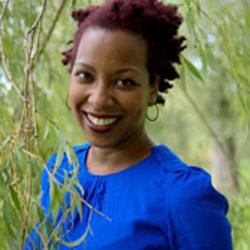
Gaylene Gould is a coach working mainly in the creative, cultural arts and media sectors. Over the weekend I listened to a very good video with Gaylene entitled
Make A Complete And Utter Fool Of Yourself where she talks about change and the creative process.
She shares the steps outlining how she navigated a big change and shift in her own working life and personal life which I could really resonate with.
Click here to watch Write Talk Listen video
Find out more about her work her at: http://www.writetalklisten.com
- How have you navigated a big change in your personal or working life?
No Comments
Saturday, February 23rd, 2013

pH Interview Series – Reaching Your Personal Goals:
Jackee Holder
Starting a new year can often bring about new and exciting goals. Your intentions are well placed, but if you’re someone that easily loses sight of their goals because the reality of life sits heavily on your shoulders and you cannot see the light at the end of the tunnel; slipping back into old habits of procrastination can often feel like a comfy pair of slippers.
I don’t know about you, but I love the changing seasons and although we may be experiencing the Winter months right now; it’s only a matter of weeks before Spring is upon us so what better time to prepare for the blossoming season by focusing on improving our healthstyle – mind, body and soul.
One of the ways we can prepare ourselves for a better now, and being the best that we can be, is getting someone to help us. This month, I meet a woman that helps people ‘be their best self’ for a living. She shared her journey to becoming a Life Coach and gave me some tips on how to work towards being your best self… Meet Jackee Holder
Tell us who you are and what you do as a profession?
I work as an Executive Coach delivering one to one coaching in the further education sectors to mangers and senior leaders, as well as delivering an accredited coach training programme to them too.
Another part of my job is to work across the different sectors and the creative industries, in which I deliver different types of leadership and management training. In this profession, I get to speak at conferences, lead retreats and all kinds of other interesting things, such as teaching creative writing. I run a practice that allows me to nurture inspiring writers and creatives. I am particularly passionate about this side of my work because this source of inspiration and creatively keeps me well resourced and energized for my corporate work, which can be demanding and stretching at times depending on the kind of organization I am working with.
I’m the author of three books, ‘Soul Purpose’, ‘Be Your Own Best Life Coach’ and ’49 ways To Write Yourself Well’. In addition, I have authored numerous workbooks and e-books, which are slowly getting birthed in new formats on my website.
Because I have gained so much encouragement and vitality from other people’s writing, blogs, personal experiences that just simply make my heart sing, I felt I wanted to create a community of my own, so I am establishing an online community where individuals can be creatively watered and fed.
For those of us who are unclear of what your job entails, can you elaborate on what a ‘Life Coach’ does?
Well, I am less of a Life Coach than I used to be and that is because the majority of my coaching takes place in corporate environments.
Life Coaching is where I began coaching. A Life Coach works on general life areas with an individual, helping them to shift behaviours, attitudes or beliefs so that a specific goal or objective can be achieved. So, as a Life Coach I could work with an individual on relationships, time management, career, writing or creativity and their well-being. The areas can be quite vast. But generally I found that people contacted me when they were either emotionally feeling stuck, had experienced a life crisis, experiencing a challenging relationship or they wanted to write or do something similar to what I was doing.
Over the years I have worked with some challenging situations, some very public and some very private but always I watched as no matter how difficult the situation the individual was experiencing, they would begin to make sense of what they were going through.
Typically I would work with an individual for an agreed number of sessions say 6 x 1 hour sessions. We would agree from the start the areas they wish to focus on and what their expected outcomes would be. Sometimes it would soon become apparent that these weren’t the real issues and we would find ourselves diverting towards the real underlying issues.
My clients tell me I am a good listener. I’m not so good a listener with my family and friends, however, when I am coaching it’s like I access a different deeper part of myself that shifts the quality of my presence and ability to just be. I would like this to be more congruent in all areas of my life but I realize that I won’t reach that ideal of perfection and I am more willing to give myself permission to be human.
I’ve received a lot of coaching myself and had some amazing experiences and shifts too so I know intuitively what works best for me. It’s not all the fancy techniques and tools very often for me it’s real conversations where I feel heard and seen that allows real transformation and learning to take place.
What, if any, put you on the path that you are on today?
Where would you like me to start? Some of my early childhood experiences forced me to confront some difficult life experiences that I knew once I had gotten into my teens that I needed to make sense of. I grew up in a family of six children and we were not all without our faults or our challenges. But I knew from an early age that I had a wise head on me. I was genuinely interested in people and I was keen to learn. When I finished university I became a youth worker and it was like the heavens had opened and I found my calling.
In this one profession I could write, I could train people, I could facilitate and run groups, I could be creative, I could talk and be with people. I could think and share my opinions plus go on really great training courses. I felt I was in a sweet shop with so many goodies. It was one of the best times of my life. An opportunity to receive coaching as part of my development back in the 80’s put me on track although it took years for me to fully embrace to become a coach but the foundations were laid back in those early days of working in Hackney.
I also had a lot of people input into my life who made a difference and I guess I modelled myself on many of my mentors who helped to shape and mould me. I had a lot of hang ups due to my upbringing so even though I was a fighter and someone who achieved a lot I had a lot of stuff to work through and needed the input of others. I guess much of that valuable input made a lasting impact and I wanted to contribute to others in a similar way.
Would you say that your work only caters for a minority of people?
I find that coaching has become very pigeon holed. It is pricing many people out and I am an advocate of making coaching accessible and not elitist as it is in many circles. So, by keeping coaching in pockets ensures that the elitism continues. I strongly believe that coaching should be a communication tool that is made available to everyone. It would not be devastating to me if coaches were done out of their profession as a result of the whole coaching process becoming more readily available to anyone needing it, that would be a good thing because I believe work places would be much better environments to work in with an embedded coaching culture and approach. In turn, relationships and communities could benefit too.
I find that I bring coaching into every area of my work whether I am running a coach training programme or a writer’s retreat. The skills are transferable in almost every area of life and work.
So, I come to you as a potential client with a need to unblock my creative mind, how would you help me with this?
We would explore and we would experiment by trying things out. This would take place in and outside of the session. One of the experiments would involve some writing, drawing and making a collage.
I would invite you to share about your childhood and times when you were creative and absorbed in doing things.
I would be on the lookout as I listened to any creative blocks and looking to find out about when they first developed.
There is no easy answer to this question. Each individual is unique and different. In one session with a Vice Principal of a big inner city college I shared my love of walking and that led me to finding out a big creative block he had for over ten years around being a painter. He had stopped painting when he entered academia. He had a painting studio in his home that had remained locked for ten years. Our work together explored his reconnection with his creativity and painting.
I am not a formulaic coach. I wish I could be more like that sometimes as some coaches are good at taking their experiences and packaging them into steps and e-course etc. but that is really not my strength.
Who Is Your Biggest Inspiration?
My daughter Aida is a huge inspiration to me. She’s 23 and living and working in Dubai, she is seeing the world. She is such a loving, joyous child that if she wasn’t my daughter I would love her as a God-daughter or a younger friend. I see a lot of myself in her but she seems to have got a lot more positives all round. We look a lot like each other and sound like each other and we can laugh and hangout with each other no problem.
The other inspiration to me is my 80 year old Mum. My Mum and I had a difficult relationship growing up. Neither of us really understood each other. I was always rebelling, resisting and being a bit of a pain. But getting older I have really come to appreciate my Mum as a person and learnt a great deal about what she has had to deal with, overcome and come through. Now I see and appreciate her so differently from the young Jackee growing up. Raising six children, having a nervous breakdown, recovering, her resilience – amazing. She was astute with money and still is and made ends meet always. Us kids were always dressed in the best clothing. She had a great eye for style another quality we have all inherited from her and my Dad. But most of all I woke up recently to realize just how humorous and funny my Mum is. Again another characteristic I had overlooked. Each of her children have inherited a bit of our mum’s humour and witty side of her.
Do you have any Seminars or Workshops coming up for anyone needing help to kick-start the New Year?
I’m doing a Writing With The Senses One Day Retreat in Kent on Saturday May 18. See our website for further details: www.jackeeholder.com I’m also speaking at the conference for Black therapists on the 27 April 2013 on the theme of Self Care.
Would you say you have your work/life balance as you want it to be?
Right now, today, no way. The work is overwhelming at times. Running accredited coach training programmes take up a lot of time and requires a great deal of input. Some weeks I feel like it is full on everyday. But I am very good at taking chunks of time off. [To find my balance...]
- I retreat back to Barbados every August without fail with my family.
- I take time off on all the holidays and bank holidays and many weekends will begin to become a mini holiday.
- I travel quite a bit with my work so will build in downtime if I am staying over night in a different place other than London.
- I invest quite a bit in training, my own training and find those dates and times therapeutic and a time to refuel.
- I’m very social and we have lots of dinner and garden parties and celebrate birthdays by getting people round.
- I love getting out and being with nature to recharge my battery.
It’s the beginning of 2013 and someone wanting to reach their personal goals for this year, what tips do you have to share?
- Write them down in a notebook or a journal. Research has shown that most people achieve their goals when they’re written down than when they’re not.
- Connect with someone who is further along the road in achieving a goal similar to yours. Find out what got them there, get tips, make a connection.
- Join a Mastermind group with other like-minded people where you can have monthly check-in’s and talk about your progress. Think of positive, achieving people to invite into your circle. It needs be no more than three other people. Your Mastermind group can hold you accountable. Or if a Mastermind group doesn’t feel right consider finding yourself a mentor.
- If you have a goal just get on with working towards it. Sometimes talking about it dispels a lot of your energy. That’s the real ‘ying’ and ‘yang’ of goal setting. Sometimes it’s good to talk and sometimes you just need to get on and do it.
- Cultivate a spiritual or mindful practice. Some kind of practice where you still your mind and know that whatever the outcome of your goals, you’ll be okay.
For more information about Jackee Holder sign up to her newsletter at: www.jackeeholder.com
Download free Jackee Holder creativity manifesto and wallpaper by clicking below:
Jackee Holder Creativity Manifesto
Jackee Holder Creativity Wallpaper
No Comments
Sunday, February 10th, 2013
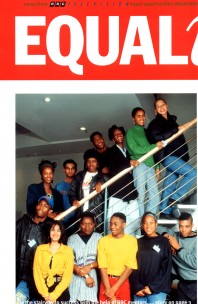
That’s Camille and me on the back row. I’m first from the left on the back row and Camille is first from the right on the back row. Photo was taken in 1991 at BBC White City, West London
Back Story
I’ve had my fair share of mentors and mentees in my life. But in this blog post I share a personal account of a special mentoring relationship that has lasted over eighteen years with three young people (Camile Curtis Y Van Dyke, Tokunbo Ajasa-Oluwa and Kwadjo Dajan) I began mentoring at the BBC in 1991. What follows is a short history of our journey together.
In 1991-1994 I worked at the BBC as the BBC Mentor Project as coordinator of an educational programme for young Black students from Hammersmith College a college local to the BBC centre at White City.
It was an exciting time working on a project that pushed the boundaries. It was the perfect post for me bringing together my earlier background and training as a Youth and community worker as well as my growing experience in training and development.
The scheme matched 12 young people between the ages of 16-17 with Black mentors across the BBC ranging from presenters, producers, technicians and cameramen. Providing one to one mentorship and shadowing from mentors along with a personal development programme the scheme aimed to increase the confidence of young black people to consider careers in the media and the BBC where Black and ethnic minority staff were significantly underrepresented.
It was an incredible pool of raw talent. I could feel and taste that talent during the interview stage. Many were turned away who fitted the bill than we had space for and the majority who were recruited onto the programme have gone on to create good and successful careers and lives in so many ways. I am deeply proud of all of the students that participated on the programmes during my time with the BBC.
Three particular students stood out for me, firstly Camille Curtis Y Van Dyke who was a member of our first cohort and then secondly best friends Kwadjo Dajan and Tokunbo Ajasa -Oluwa.
Each stood out for a number of reasons. As a result of Camille’s influence and leadership on the first programme we created a post of Mentor Student co-coordinator, which, saw her acting as a student, liaison officer on our second programme. She immediately connected with Kwadjo and Tokunbo and Toks as we know him became the Mentor Student co-ordinator on the second programme. All three are incredibly close to this day.
Each had an incredible charisma and demonstrated strong leadership skills on so many levels in their early days. They would be the one who would stay behind and talk through the programme with me, pitching ideas and making suggestions. Even though I was still in my early thirties I felt like the older big sister taking care of her younger siblings. I had no doubt that each would carve out a name for themselves in the world of work.
Leaving the BBC
I left the BBC in the third year of the programme but remained in contact with all three. We met once or twice a year for dinner where we spend the whole evening taking turns sharing the twist and turns of our lives and sharing our visions and dreams for our work and careers. We would creatively brainstorm around project and ideas and offer each other the necessary support and guidance.
We were also truth tellers with each other. Feedback was always part of our conversations and we would tell each other like it is knowing which of us was best placed to go there.
In-between our face to face catch up’s I would be a listening air on the phone and the one they would turn to when making some of the bigger decisions in their lives. But over time our roles reversed and increasingly they became champions of my work, suggesting and guiding me with their different views and perspectives. It was a refreshing and much welcomed change of role and I loved growing into the new space with each of them.
It was inevitable that they became a part of my personal and family life attending my graduation ceremony as an Interfaith Minister and significant family events. They watched my daughter Aida whom they have known from the age of three grow up from being a child into a teenager and this is where they each became more involved in her life first as supporting friends and then each easing into the role as her own personal mentor.
Passing On The Mentoring Baton
When at sixteen she needed work experience Kwadjo stepped in through his work as a producer at ITV and Channel Four and set up for her to shadow him. She also took part in a round table discussion between a group of young people and award winner theatre writer and actor Kwame Kwei-Armah. The very networking the BBC had wanted to nurture in the industry was now happening in my own back yard.
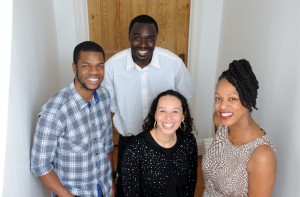
Left to right Tokunbo Ajasa-Oluwa, Kwadjo Dajan,
Camille Curtis Y Van Dyke and Jackee Holder
Where Are They Now?
Camille Curtis Y Van Dyke has built a great and valuable career working with young people and nurturing their art and creative talents as the Social Inclusion Project Co-coordinator at WAC Performing Arts and Media College based in Haverstock Hill in North London.
She is a manager and leader who leaves no stones unturned, will and does go that extra mile and has made a real and significant difference to the lives of young people she works with. She is full of get up and go, she’s bold and courageous and is one for making things happen.
She has two brilliant children of her own and has grown into an amazing woman whom I completely adore and who is always completely affirming of our relationship.
She has lost none of her charm as a young woman or her humour and wit. Whenever I hear her voice on my voice mail or meet with her in person she lights up my day. I love her to bits and she feels like a daughter I could have had.
Tokunbo Ajasa-Oluwa left the BBC Mentor project and co-founded the Origins rites of passage programme for young men of African Caribbean descent, which still operates today.
He went on to peruse his love of journalism eventually establishing his own online magazine for young people Catch 22 a dynamic social enterprise that engaged, trained and championed excluded young media talent.
He is an amazing creative and strategic force and is now Head of O2 and Bauer Media’s Go ThinkBig that supports the career aspirations of the under 25’s in the UK.
Kwadjo Dajan has solidly earned his stripes in the world of investigative journalism honing his skills in the media and with his mentors from the days of the BBC Mentor Project. He’s one of the UK’s youngest and rising, most respected investigative journalists whose worked as producer and director on television shows like Airport, Airline and the more recent Mrs Biggs.
He has a gift for sniffing out stories and gets people to open up to him and share their stories when others have been unable to do so. He has amazing rapport and an ability to get people to place their trust in him at a drop of a hat. He would definitely not like me saying that about him. He is the most humble and gracious human being.
His career achieved a recent national and global peak when in 2012 he was awarded the BAFTA Break Through Talent Award for his award winning television programme, Appropriate Adults, a factual drama telling the story of Gloucester housewife Janet Leach, who helped solve the crimes of Fred and Rosemary West.
Kwadjo is responsible for the video clip on the front page of my website.
Becoming Godparents
All three are outstanding and stunning individuals whom I feel honoured to have as a part of my life so much so that in 2003 when Aida turned 18 I decided to appoint her a new set of Godparents to guide her through the passage of young adulthood.
We held a ceremony where twenty friends and family members gathered to witness the new Godparents being sworn in. Kwadjo and Tokunbo were amongst the newly appointed Godparents and Camille was formally appointed as Godparent in 2011.
Each has taken their role seriously and have nurtured independent relationships with Aida outside of their relationships with me. Each brings something different and unique to the table in their engagement with Aida.
Camille keeps it real and reminds Aida to have fun and stretch those boundaries in life.
Kwadjo is a strong grounding force of common sense and keeping your feet on the ground.
Toks (as he is known to us) straddles between the two offering creative and emotional perspectives that remind Aida that we’re all human and nudges towards that creative spark. I have no doubt that the mentorship baton has been now passed on.
Take Away’s
None of us have been without our ups and downs, relationships and careers have come and gone but we have stayed together providing a strong current of support and encouragement for finding our sweet spot and being our authentic selves in the world.
I can honestly say that I have learnt an incredible amount from all three. Our relationships remind me that in the dynamic of any mentoring relationship there is learning for both mentor and mentee and at some times if we allow it to the tables change and we enter into a flow of learning that sees roles and titles fade away as unique relationships develop between individuals.
In 2013 I consider all three my peers, no longer the younger ones. Who knows as I grow in years maybe now the tables will turn and I will seek out their mentorship and advice as my business moves in new and different directions. I hope so.
In the next few blog posts Camille, Tokunbo, Kwadjo and Aida get to share their perspective on our relationships over the last 18 years.

From left to right: Camille Curtis Y Van Dyke, Kwadjo Dajan, Jackee Holder and Tokunbo Ajasa-Oluwa
Photo Credits: Sharron Wallace 2012
1 Comment
